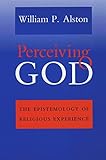Perceiving God : The Epistemology of Religious Experience / William P. Alston.
Material type: TextPublisher: Ithaca, NY : Cornell University Press, [2014]Copyright date: ©2014Description: 1 online resource (336 p.)Content type:
TextPublisher: Ithaca, NY : Cornell University Press, [2014]Copyright date: ©2014Description: 1 online resource (336 p.)Content type: - 9780801471254
- 248.2/01
- BT102 .A46 1991
- online - DeGruyter
| Item type | Current library | Call number | URL | Status | Notes | Barcode | |
|---|---|---|---|---|---|---|---|
 eBook
eBook
|
Biblioteca "Angelicum" Pont. Univ. S.Tommaso d'Aquino Nuvola online | online - DeGruyter (Browse shelf(Opens below)) | Online access | Not for loan (Accesso limitato) | Accesso per gli utenti autorizzati / Access for authorized users | (dgr)9780801471254 |
Frontmatter -- Contents -- Acknowledgments -- Introduction -- 1. The Experience of God: A Perceptual Model -- 2. Epistemic Justification: Perceptual and Otherwise -- 3. The Reliability of Sense Perception: A Case Study -- 4. A “Doxastic Practice” Approach to Epistemology -- 5. The Christian Mystical Perceptual Doxastic Practice (CMP) -- 6. Can the Christian Mystical Perceptual Doxastic Practice Be Shown to Be Unreliable ? -- 7. The Problem of Religious Diversity -- 8. The Place of Experience in the Grounds of Religious Belief -- Bibliography -- Index
restricted access online access with authorization star
http://purl.org/coar/access_right/c_16ec
In Perceiving God, William P. Alston offers a clear and provocative account of the epistemology of religious experience. He argues that the "perception of God"—his term for direct experiential awareness of God—makes a major contribution to the grounds of religious belief. Surveying the variety of reported direct experiences of God among laypersons and famous mystics, Alston demonstrates that a person can be justified in holding certain beliefs about God on the basis of mystical experience. Through the perception that God is sustaining one in being, for example, one can justifiably believe that God is indeed sustaining one in being.Alston offers a detailed discussion of our grounds for taking sense perception and other sources of belief—including introspection, memory, and mystical experience—to be reliable and to confer justification. He then uses this epistemic framework to explain how our perceptual beliefs about God can be justified. Alston carefully addresses objections to his chief claims, including problems posed by non-Christian religious traditions. He also examines the way in which mystical perception fits into the larger picture of grounds for religious belief.Suggesting that religious experience, rather than being a purely subjective phenomenon, has real cognitive value, Perceiving God will spark intense debate and will be indispensable reading for those interested in philosophy of religion, epistemology, and philosophy of mind, as well as for theologians.
Mode of access: Internet via World Wide Web.
In English.
Description based on online resource; title from PDF title page (publisher's Web site, viewed 26. Apr 2024)


